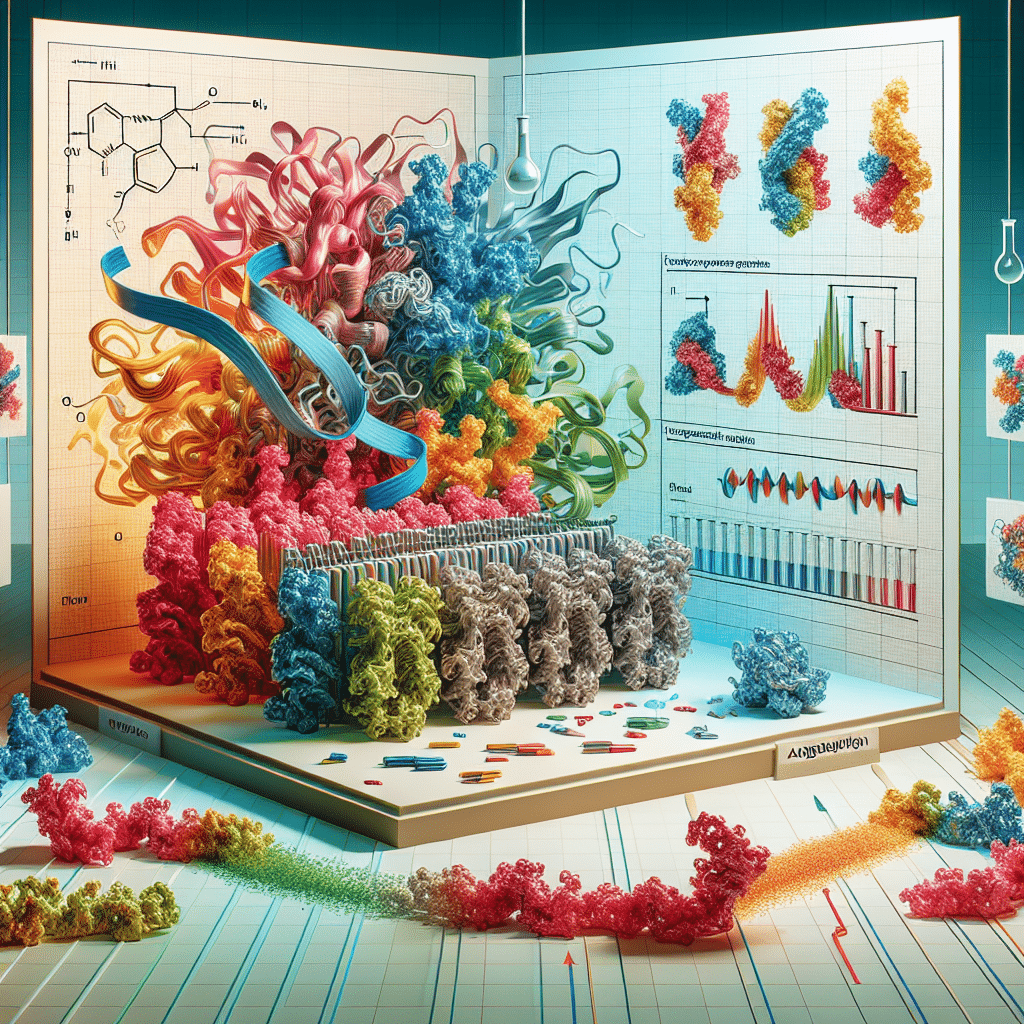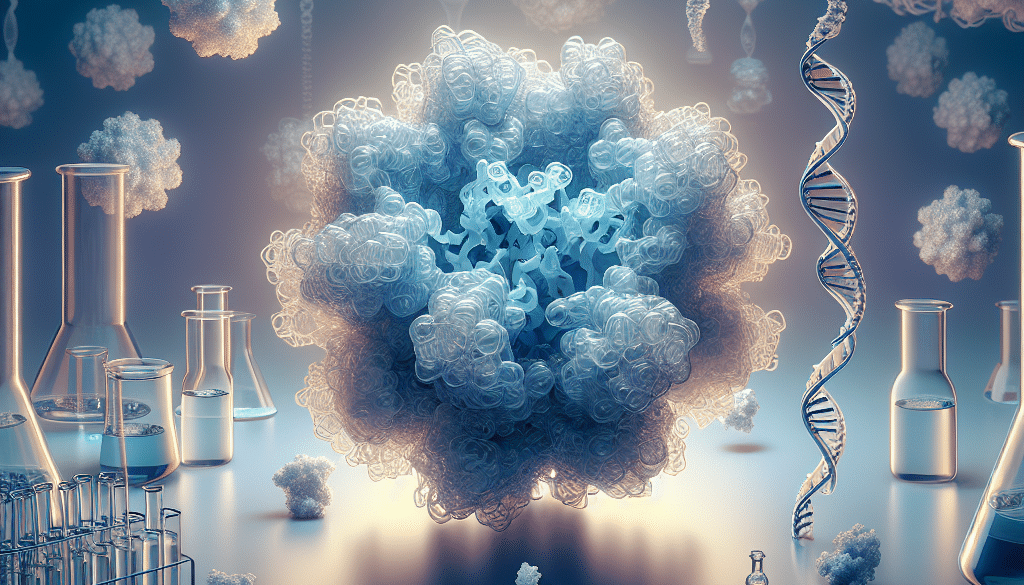Protein Stability and Aggregation: Ensuring Quality and Function
-
Table of Contents
- Protein Stability and Aggregation: Key to Quality and Function
- Understanding Protein Stability
- The Challenge of Protein Aggregation
- Strategies for Enhancing Protein Stability
- Case Studies and Examples
- Measuring Protein Stability and Aggregation
- Impact on Industry and Research
- Conclusion: The Importance of Protein Stability and Aggregation
- Discover ETprotein’s High-Quality Protein Products
Protein Stability and Aggregation: Key to Quality and Function

Proteins are the workhorses of the cell, performing a vast array of functions essential for life. From catalyzing biochemical reactions as enzymes to providing structural support in tissues, proteins are indispensable. However, their functionality is inherently linked to their three-dimensional structure, which is why protein stability and aggregation are critical factors in both biotechnology and pharmaceutical industries. Ensuring the quality and function of proteins is a complex task that involves understanding the principles of protein folding, stability, and the mechanisms leading to aggregation.
Understanding Protein Stability
Protein stability refers to the tendency of a protein to maintain its structure under various conditions. A stable protein retains its functional conformation, resisting denaturation or unfolding. Several factors influence protein stability, including:
- Temperature
- pH levels
- Presence of salts or other solutes
- Protein concentration
- Post-translational modifications
Proteins can lose their stability due to environmental stresses or mutations, leading to misfolding and potential loss of function. This can have severe implications, especially in the context of therapeutic proteins, where stability directly affects efficacy and safety.
The Challenge of Protein Aggregation
Protein aggregation is the process by which proteins clump together, forming larger complexes that can be soluble or insoluble. Aggregation can occur at any stage of a protein’s lifecycle, from synthesis to storage, and is influenced by the protein’s environment and its intrinsic properties. Aggregation is not merely a nuisance; it can have serious consequences, such as:
- Reducing the bioavailability of therapeutic proteins
- Inducing immune responses in patients
- Causing diseases like Alzheimer’s and Parkinson’s
Therefore, controlling and preventing protein aggregation is a priority in protein formulation and therapeutic development.
Strategies for Enhancing Protein Stability
To ensure that proteins remain stable and functional, several strategies are employed:
- Optimizing Formulation: Adjusting the pH, ionic strength, and adding stabilizing agents like sugars or polyols can enhance protein stability.
- Protein Engineering: Mutations can be introduced to increase the stability of the protein without affecting its function.
- Use of Chaperones: Molecular chaperones can assist in proper protein folding and prevent aggregation.
- Controlled Environmental Conditions: Maintaining optimal temperature and humidity levels during storage and transport is crucial.
Each of these strategies requires a deep understanding of the protein’s structure-function relationship and the conditions under which it operates.
Case Studies and Examples
Several case studies highlight the importance of protein stability and aggregation control:
- Monoclonal Antibodies: These therapeutic proteins are prone to aggregation, which can be mitigated by optimizing buffer systems and storage conditions.
- Insulin: The stability of insulin is critical for diabetes management. Formulation improvements have led to longer-acting and more stable insulin analogs.
- Enzyme Replacement Therapies: For diseases like Gaucher’s, enzyme replacement therapies must remain stable to be effective, requiring careful formulation and delivery methods.
These examples underscore the importance of stability and aggregation control in the development and use of protein-based therapeutics.
Measuring Protein Stability and Aggregation
Several analytical techniques are used to assess protein stability and aggregation, including:
- Differential Scanning Calorimetry (DSC)
- Dynamic Light Scattering (DLS)
- Size-Exclusion Chromatography (SEC)
- Fourier-Transform Infrared Spectroscopy (FTIR)
These methods provide insights into the thermal stability, size distribution, and secondary structure of proteins, helping to predict and prevent aggregation.
Impact on Industry and Research
The implications of protein stability and aggregation extend beyond the laboratory. In the pharmaceutical industry, ensuring the stability of protein drugs is paramount for patient safety and drug efficacy. In research, understanding these phenomena is crucial for the development of new therapeutics and the study of diseases related to protein misfolding.
Statistics show that the global market for protein stability analysis is growing, reflecting the increasing demand for stable protein therapeutics. The market was valued at USD 1.2 billion in 2019 and is expected to reach USD 2.1 billion by 2024, growing at a CAGR of 10.0% during the forecast period.
Conclusion: The Importance of Protein Stability and Aggregation
In conclusion, protein stability and aggregation are critical factors that determine the quality and function of proteins in both therapeutic and research contexts. By employing various strategies to enhance stability and prevent aggregation, scientists and industry professionals can ensure that proteins perform their intended functions effectively. As our understanding of protein science grows, so too will our ability to manipulate these complex molecules for the benefit of human health and disease treatment.
Discover ETprotein’s High-Quality Protein Products
If you’re in search of premium protein products that meet the highest standards of stability and quality, look no further than ETprotein. Their extensive range of organic and plant-based proteins, including rice, pea, pumpkin seed, and sunflower seed proteins, are designed to cater to a variety of industries. With a commitment to non-GMO, allergen-free products, ETprotein is your go-to source for reliable protein solutions.
About ETprotein:
ETprotein, a reputable protein Chinese factory manufacturer and supplier, is renowned for producing, stocking, exporting, and delivering the highest quality organic bulk vegan protein and plant proteins. They include Organic rice protein, clear rice protein, pea protein, clear pea protein, pumpkin seed protein, sunflower seed protein, mung bean protein, peanut protein etc. Their offerings, characterized by a neutral taste, non-GMO, allergen-free attributes, cater to a diverse range of industries. They serve nutraceutical, pharmaceutical, cosmeceutical, veterinary, as well as food and beverage finished product distributors, traders, and manufacturers across Europe, USA, Canada, Australia, Thailand, Japan, Korea, Brazil, and Chile, among others.
ETprotein specialization includes exporting and delivering tailor-made protein powder and finished nutritional supplements. Their extensive product range covers sectors like Food and Beverage, Sports Nutrition, Weight Management, Dietary Supplements, Health and Wellness Products, and Infant Formula, ensuring comprehensive solutions to meet all your protein needs.
As a trusted company by leading global food and beverage brands and Fortune 500 companies, ETprotein reinforces China’s reputation in the global arena. For more information or to sample their products, please contact them and email sales(at)ETprotein.com today.












